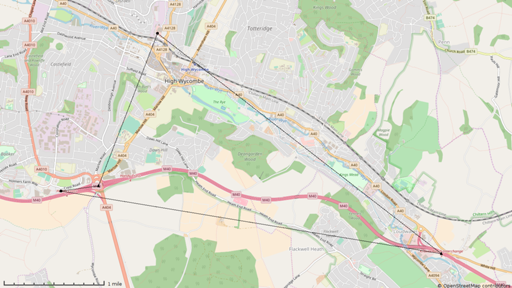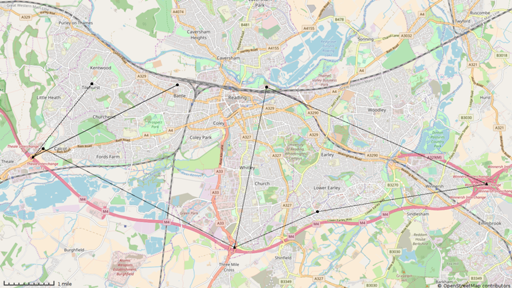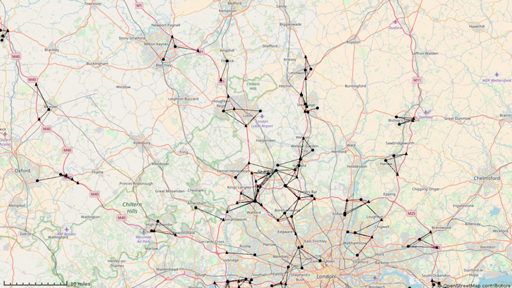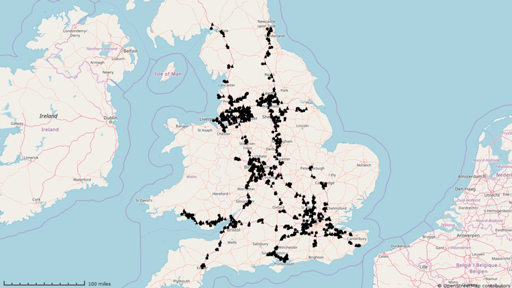A reader (hi Dave!) suggested extending the supermarket-finder to
locate supermarket fuel near motorway junctions.
The Food Standards Agency files aren't much use, but this can be
done entirely with OpenStreetMap data. The first step is to locate
junctions, as before… well, actually not as before. I got distracted.
The thing is, the motorway-only data set will fit easily into memory
on a modern machine, but larger sets (such as "all roads in the UK")
won't. And the Reader mode of LibXML is all very well for parsing
files that won't fit, but not terribly convenient. How else do we
handle data which don't fit into memory? A database! So I wrote a
converter which takes the nodes, ways and relations of OpenStreetMap
XML and turns them into SQLite. What used to be:
<node id="212531" lat="51.6024835" lon="-0.6885638" version="11" \
timestamp="2013-10-18T13:16:23Z" changeset="18419340" uid="24119" user="Mauls">
<tag k="ref" v="3"/>
<tag k="name" v="Knaves Beech Interchange"/>
<tag k="exit_to" v="High Wycombe (E) A40"/>
<tag k="highway" v="motorway_junction"/>
</node>
becomes:
CREATE TABLE node (changeset INTEGER, lat NUM, lon NUM, user INTEGER, version INTEGER, timestamp TEXT, uid INTEGER, id INTEGER PRIMARY KEY);
CREATE TABLE node_tag (node_id INTEGER, v TEXT, k TEXT);
INSERT INTO "node" VALUES(18419340,51.6024835,-0.6885638,'Mauls',11,'2013-10-18T13:16:23Z',24119,212531);
INSERT INTO "node_tag" VALUES(212531,'3','ref');
INSERT INTO "node_tag" VALUES(212531,'Knaves Beech Interchange','name');
INSERT INTO "node_tag" VALUES(212531,'High Wycombe (E) A40','exit_to');
INSERT INTO "node_tag" VALUES(212531,'motorway_junction','highway');
(the order of fields is unimportant, and random). The same thing is
done for ways and relations.
This leads to fun with subqueries:
SELECT way_tag.v,node_tag.v,node.id,lat,lon
FROM node_tag
JOIN node ON node_tag.node_id=node.id
JOIN way_nd ON node.id=way_nd.ref
JOIN way_tag ON way_nd.way_id=way_tag.way_id
WHERE node_id IN (
SELECT node_id
FROM node_tag
WHERE k='highway'
AND v='motorway_junction'
)
AND node_tag.k='ref'
AND way_tag.k='ref';
So a list of junctions can be generated much as before, though faster.
Then it's time for another osmfilter pass:
osmfilter gb.o5m --keep=amenity=fuel >fuel.osm
That "amenity=fuel" tag can be on any of three different sorts of
structure: an individual node, a way, or a relation (collection of
ways). So for each of those things we do a query to pull out the "name",
"brand" and "operator" tags (the use of these is horribly
inconsistent), and see if any of them matches the names of the
supermarkets that sell fuel in England: Sainsbury's, Tesco, Asda and
Morrison's. If so, if that's a node we already have its latitude and
longitude; for ways or relations, we do a second query to pull out all
latitudes and longitudes of constituent ways and nodes, and average
them.
At this point we use the algorithm as before to match motorway
junctions with fuel locations; but I keep track of closest points
separately for each brand of supermarket (and I set a hard limit of
five straight-line miles from the junction, because driving further
than that isn't going to produce much of a saving). So a single
junction's records may end up as:
-0.7771407,51.6115432,"M40 J4 (0.4) Asda"
-0.754612975,51.63432275,"M40 J4 (1.6) Morrison"
It's limited like the supermarket finder in that it doesn't consider
questions of accessibility, or actual driving time between junction
and garage. I have the OSRM code, but their preferred way of building
it is a Docker image, and that's rather more faff than I want.
As before, here are some
Viking visualisations.
(Triangles are the calculated junction positions; circles are the
garages.)
High Wycombe (Asda near the motorway, Morrisons in town):

Reading:

(Garages from west to east: Sainsbury's in Calcot, Asda in Tilehurst,
two Tesco branches either side of the station, and an Asda in Lower
Earley.)
The north-western part of London (with some concentration on the
Sainsbury's and Asda that share a roundabout in northern Watford):

All of England:

Comments on this post are now closed. If you have particular grounds for adding a late comment, comment on a more recent post quoting the URL of this one.